People are asking if WAP is too Raunchy. They’re missing the point.
“WAP,” the new single from Cardi B and Megan Thee Stallion, is already making history. The hip-hop collaboration smashed the record for most streams for a song in its debut week, with over 93 million plays as of August 13. And on YouTube, the flamboyant music video has already garnered an unreal 100 million views.
Still, some have cried foul about the song’s explicit lyrics, another dumb, dirty pop song with no depth. CeeLo Green even called the song “shameless,” and “disappointing on a personal and moral level.” Those are strong words from an artist whose most memorable song was titled “F**k You.” But is there more to “WAP” than pure shock value?
Like CeeLo’s song, Cardi and Megan’s newest hit also has a title intended to shock. “WAP” actually stands for “Wet Ass P***y.” Deepest apologies if that offended you.
Of course, if the title of the song is too much, you’re better off not even listening at all. The entire track is a celebration of the female libido, using clever metaphors and not-so-subtle innuendos. The song is about sex and nothing else.
But it’s also a wildly fun, groundbreaking endeavor. After all, male rappers have been using explicit sexual lyrics in their music for ages. For those of us who came of age in the early 2000s, middle school dances were scored by the likes of “Candy Shop,” “Get Low,” “I’m in Love With a Stripper,” and “I’m Sprung.” Common fare even on FM radio.
And certainly sex in music is much older than even the overtly graphic hip hop of the early aughts. (‘Rock and Roll’ is a sexual reference that can be dated to blues recordings from the 1920’s and 30’s). As far back as people could write poetry, authors were describing their favorite body parts and the things they wish they could do with them. And that kind of erotic obsession has never been exclusive to music. Paintings, sculptures, epics and odes have all explored sex and sexuality, since the first cave artists painted the human form in all its curviness.
What really sets “WAP” apart from the ubiquitous raunchiness of the 2000s is both how subversive and how smart it is. Both Cardi B and Megan Thee Stallion are self-made megastars, women who used their social media savvy not just to develop singing careers, but to become beloved public personalities. Using their power on Instagram, Twitter, and TikTok, both women have grown personal brands that include music, clothing, lifestyle, and even politics. “WAP” is not just another cliché sex song.
Contrary, it represents a reclaiming of sexual autonomy. Women have long been the subject of dirty lyrics, but to be the ones singing about their own urges and desires is a flip of the switch. They are in control of this story, not just the unwitting props. Of course, such greats as Nicki Minaj, Li’l Kim, and Missy Elliot must get some credit for pushing the boundaries of female sexuality in music. Each has written and performed with great cleverness about their bodies.
But ultimately, “WAP” works because it’s so funny. It’s not a serious ode to the plight of women. It’s not a haunting story of betrayal. Rather, it’s an unabashed monologue about sexual urges, using witty images and clever rhymes to tell the story.
So to any naysayers who bemoan the sheer raunchiness of the track, don’t let your prejudices deter you. It may be dirty, but it’s not dumb.

